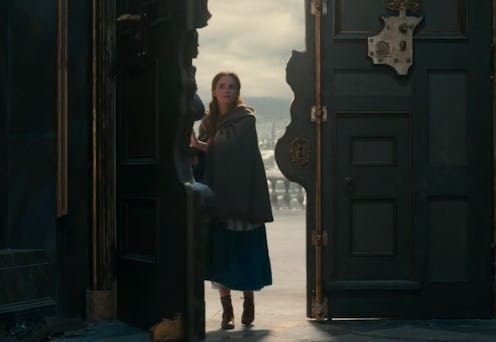
A lot has been said about how the new live action Beauty and the Beast has updated the story to make it more feminist. Star Emma Watson is known for her feminist activism, and she has spoken out about working with director Bill Condon on making the film as female-positive as possible. They updated Belle's wardrobe and made her an inventor, not just a daughter of one, and Watson even brought Gloria Steinem to see the film to get her opinion on her new Belle. But one of the most feminist changes in Beauty and the Beast actually has nothing to do with Belle. Instead, it's the introduction of a new character, Agathe, who, in Beauty and the Beast, adds a feminist twist on the role of the Enchantress.
Just a nameless and vindictive creature in the animated film, the Enchantress depicted in the new Beauty and the Beast, as played by Hattie Morahan, has a life beyond just cursing a spoiled Prince who refused to give her shelter. Named Agathe, the Enchantress appears in the prologue scene to curse the Beast, but she also pops up throughout the film as a villager. Agathe makes her debut in the film as the provincial town's local old maid. She is an unmarried woman left begging on the streets, used by Gaston as a cautionary tale after Belle tells him she doesn't want to go out with him. Pointing to Agathe, Gaston warns Belle that, in this town, an unmarried woman is destined to end up on the street.
In Beauty and the Beast, Agathe personifies the strict limitations placed on women of the time period (the film takes place in 18th Century France). A single woman of maybe 30 years of age, she is largely ignored by the townspeople. Even Belle, who herself is at risk of being ostracized by the townspeople for being a woman who reads, doesn't seem to give her much thought. She gives Agathe little more than a casual glance her way when Gaston points her out. Ignored by the townspeople, living as a beggar, it's no wonder Agathe put a curse on the Prince all those years ago. She's lived in the oppression of patriarchal society for years, cast aside for not marrying and then living at the mercy of strangers.
Agathe's story isn't all doom and gloom. It's later revealed that she has a makeshift camp out in the forest, where she's able to live peacefully outside of the persecution of the small town. She brings Maurice there after finding him close to death in the woods, where Gaston left him, and saves his life with what could be a kind of magic potion. She doesn't intervene further, however, suggesting that she prefers to stay out of the way, jumping in only to reward good people or punish bad ones.
Perphas the most significant change to the story in the live action Beauty and the Beast is the presence of Agathe at the end of the film. In the movie, the last rose petal has already fallen when Belle tells the Beast that she loves him. Belle didn't break the curse at all, Agathe did. When the townspeople rush the castle, she enters with them, slipping in among the angry mob and making her way up to the West Wing of the castle. After witnessing Belle's declaration, Agathe makes the conscious decision to lift the curse. In other words, she plays an active role in creating their Happily Ever After. Ultimately, the power to break the curse is in her hands and hers alone. She's not just a random witch, she's a woman with agency.
By making the Enchantress a more active and empowered character, Beauty and the Beast presents a much more full and feminist story. Agathe's hardships help illustrate everything at risk for Belle should she never leave the Provincial town. They also paint a complete picture as to why Agathe would curse the Prince in such a severe manner. Cursing a spoiled prince for not giving her a helping hand makes a lot more sense when you consider how Agathe has been shunned simply because she is unwed.
Like Belle, Agathe seems to be a woman ahead of her time. Magical abilities or not, that's something many women struggling with gender roles can relate to.